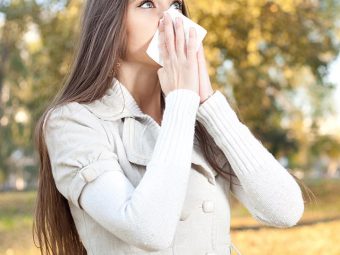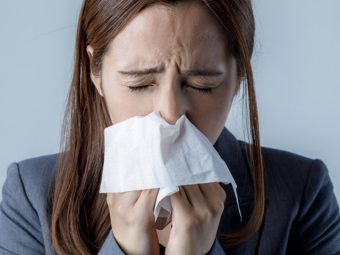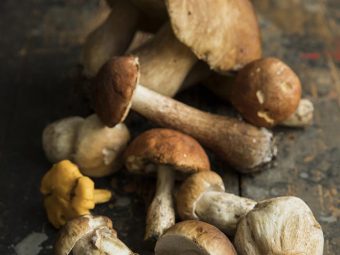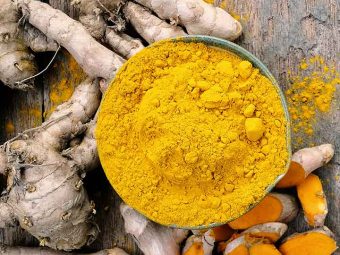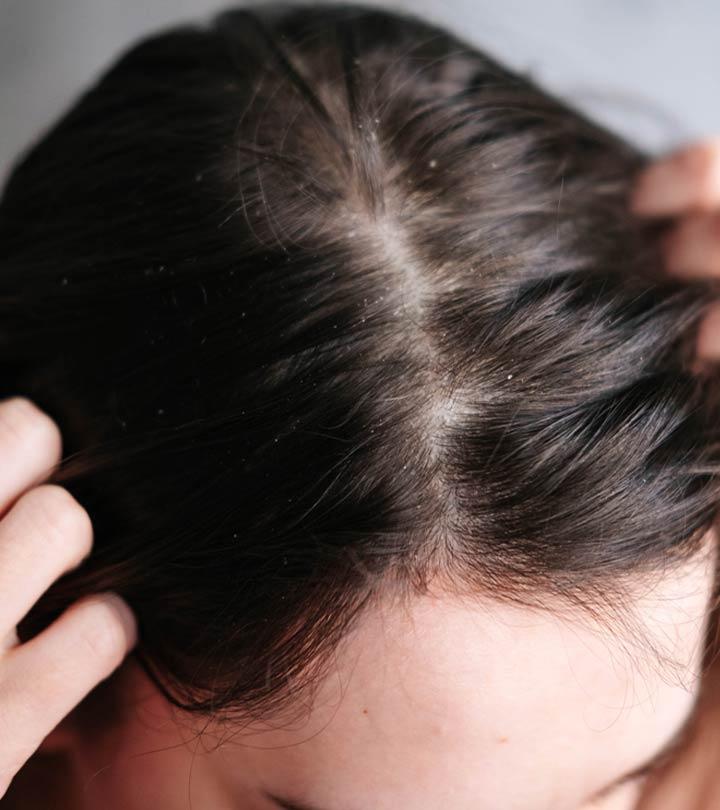How To Stop A Runny Nose – 10 Home Remedies That Work
Keep your tissues and cold at bay with these easy and effective natural solutions.

Image: Shutterstock
A runny nose is characterized by mucus pouring or ‘flowing’ out of your nostril. To figure out how to stop a runny nose using the most appropriate home remedies, you need to first understand what is causing it. There are various reasons why you may get a runny nose. Cold weather, illness, or allergies can all contribute to it. For instance, when a cold virus or an allergen like pollen or dust enters your body, it irritates the lining of your nose and sinuses (air-filled pockets around the face), causing your nose to produce a lot of clear mucus. This mucus holds germs, viruses, and allergens in your nose and sinuses, allowing them to be flushed out. This article lists some of the best home remedies to manage this condition. Keep scrolling to check them all out!
In This Article
How To Stop A Runny Nose – The 10 Best Remedies
- Essential Oils
- Salt Water
- Steam
- Ginger
- Garlic
- Turmeric
- Eucalyptus Oil
- Apple Cider Vinegar
- Honey And Lemon
- Mustard Oil
- Neti Pot
1. Essential Oils For Runny Nose
You Will Need
- 3 drops peppermint oil
- 5 drops lavender oil
What You Have To Do
- Mix the essential oils and apply on the chest, neck, and the bridge of the nose.
- Leave it on.
How Often You Should Do This
Reapply twice or thrice a day.
Why This Works
Peppermint oil contains menthol, which decongests the chest and thins the mucus. It also increases the sensation of nasal airflow and reduces respiratory discomfort (1). Lavender oil is antibacterial and antifungal in nature and can treat the infection that might be causing the runny nose. It also calms the senses (2).
2. Salt Water For Runny Nose
You Will Need
- 1 1/2 teaspoons salt
- 2 cups warm water
- Dropper
What You Have To Do
- Add the salt to the water and mix well.
- Use the dropper to administer these saline drops into your nose.
How Often You Should Do This
Do this a few times in a day, till you get relief from a runny nose.
Why This Works
Salt water will thin down the mucus, thus making it easier for the body to expel it quicker. It also helps clear the nasal passages of any irritants (3).
 Quick Tip
Quick TipWatch This Video To Learn How Salt Water Helps To Cure A Runny Nose
3. Steam For Runny Nose

You Will Need
- A bowl of hot water
- A large towel
What You Have To Do
- Hold the towel over your head and inhale the steam from the hot water bowl.
- Continue this for 10 minutes. Then, blow your nose.
How Often You Should Do This
Repeat this three to four times in a day.
Why This Works
The warmth of the steam breaks down the mucus that gives you the stuffy nose feeling (4). When you blow your nose, this accumulated mucus easily comes out.
 Quick Tip
Quick TipEricka Eckles, a blogger, shared her experience with inhaling steam made with lavender, eucalyptus, and bergamot essential oils and water to treat her runny nose. She advises, “If you use too much essential oil then it can be too harsh for your delicate nose membranes (i).”
4. Ginger For Runny Nose
You Will Need
- Ginger
- Salt
What You Have To Do
- Grate some ginger and add a pinch of salt and chomp away on it.
- You can also brew some fresh ginger tea and drink it.
How Often You Should Do This
Chew ginger several times during the day.
Why This Works
We all know ginger has antioxidants that can cure a myriad of ailments. It also has antiviral and antifungal properties that get to the root and banish a runny nose (5).
5. Garlic For Runny Nose
You Will Need
Small garlic cloves
What You Have To Do
Chew the garlic clove and ingest it to get relief from a runny nose.
How Often You Should Do This
Have three to four small cloves in a day.
Why This Works
Garlic will warm up your body and give you immense relief from a runny nose. The allicin present in it possesses antiviral, antibacterial, and antifungal properties that will kill the microbes causing the runny nose symptoms (6).
6. Turmeric For Runny Nose

You Will Need
- 1 teaspoon turmeric powder
- 1 cup linseed oil
What You Have To Do
Soak the turmeric powder in a cup of linseed oil, and inhale the smoke emitted. Use freshly ground turmeric powder preferably.
How Often You Should Do This
Repeat this twice a day.
Why This Works
An antidote for cuts and wounds, turmeric also works wonders in putting a halt to that leaky nose. A small pinch of turmeric powder is loaded with antiviral, antibacterial, anti-inflammatory, and even antioxidant properties (7). This will loosen the mucus and make you feel less irritable.
7. Eucalyptus Oil For Runny Nose
You Will Need
- Eucalyptus oil
- A handkerchief
What You Have To Do
Just dab a few drops of eucalyptus oil on the hanky and inhale it through the day to appease the symptoms of a cold and runny nose.
How Often You Should Do This
Repeat this every day until the runny nose clears up.
Why This Works
The antiviral and antimicrobial properties of eucalyptus oil and their benefits for cold symptoms are well known. This potent essential oil also has anti-inflammatory and analgesici XA medicating drug or substance that relieves the pain (mild or severe) and reduces inflammation. properties (8, 9).
8. Apple Cider Vinegar For Runny Nose
You Will Need
- 2 teaspoons apple cider vinegar
- 1 teaspoon honey
- 1/2 teaspoon cinnamon powder
- A glass of warm water
What You Have To Do
- Add the vinegar, honey, and cinnamon to the glass of water and mix well.
- Drink this while it is still warm.
How Often You Should Do This
Have this drink twice a day.
Why This Works
The antibacterial and antiviral properties of apple cider vinegar come in handy when it comes to treating a runny nose. It also exerts anti-inflammatory effects on the body. This property proves to be beneficial when the runny nose is due an allergic reaction that causes inflammation (10).
9. Honey And Lemon
You Will Need
- 1 tablespoon honey
- 3-4 drops fresh lemon juice
- A glass of lukewarm water
What You Have To Do
Mix the honey and lemon juice in the water and drink this.
How Often You Should Do This
Drink this water twice daily.
Why This Works
The antimicrobial activity of honey works synergistically with that of lemon to treat the microbes causing the nasal infection. Honey also reduces inflammation of the nasal passages (11, 12).
10. Mustard Oil
You Will Need
What You Have To Do
Heat a tablespoon of mustard oil until it’s a tad bit warm and gently put in a few drops of it into your nostrils.
How Often You Should Do This
Do this in the morning and night until the rhinorrhea symptoms go away.
Why This Works
This oil is enriched with antibiotic and antiviral properties that will get to work in no time (13). It will work at both eliminating the cold and relieving the symptoms of a runny nose.
11. Neti Pot
You Will Need
- A neti pot
- Filtered water or saline solution
What You Have To Do
- Add the solution to the neti pot.
- Pour the solution from the neti pot through one nostril and out the other.
Why This Works
The neti pot helps in clearing mucus from your nose.
The above-listed remedies will not only provide relief from a runny nose but will also help alleviate other common cold symptoms like a stuffed nose and sneezes.
Aside from these home remedies, you could also try over-the-counter medications like nasal sprays. These sprays typically contain active ingredients like antihistamines or decongestants that help reduce nasal congestion and excessive flow of mucus (14). By targeting the source of the runny nose, they provide a more direct and rapid response compared to oral medications. However, use them as directed and avoid prolonged use as they can lead to a rebound effect, worsening the symptoms. While nasal sprays can be an effective temporary solution, persistent or severe nasal issues should be discussed with a doctor to rule out underlying causes.
Let’s now look at the causes.
What Causes A Runny Nose
A runny nose or rhinorrhea can be caused due the following reasons:
- Common cold
- Flu
- Hay fever
- Allergies
- Pregnancy
- Vasomotor rhinitisi XInflammation of nose tissues caused by the dilation of nasal blood vessels that results in nasal congestion, runny nose, and sneezing.
Among these, cold or flu is the most common cause for rhinorrhea or a runny nose (15).
Signs And Symptoms Of A Runny Nose
The main symptom of a runny nose is the excess mucus that is being produced in the nasal passages and, probably, even dripping out from the nostrils. This excess mucus blocks the nasal passages, making it difficult to breathe through the nose. Other signs and symptoms include:
- Headache
- Facial pain
- Sneezing
- Nosebleeds
Sore throat or ear infection can develop if the infected mucus travels into the ear canals or back up into the throat.
How To Fix A Kid’s Runny Nose At Home
You can use any of the simple home remedies listed above to treat your kid’s runny nose. These remedies are safe to use for kids and adults.
Preventive Measures To Avoid A Runny Nose
Take these measures to avoid that annoying dripping nose, especially in the winters.
- Stay away from allergens. Use air purifiers to refresh indoor air
- Cover your nose, mouth, and neck with a woollen scarf while heading outdoors during the winters
- A dry atmosphere at home can also trigger a runny nose. Use a humidifier to maintain indoor humidity levels
- Keep your body well hydrated. Drink plenty of water – at least 10 glasses in a day
- Maintain a healthy diet rich in vitamins and minerals
In a survey conducted on 8000 adults who were smokers and had exposure to gas, fumes or dust, it was found that 40.7% had runny nose, 55.1% had chronic rhinitis and 49.1% had nasal congestion. Active smoking, exposure to environmental tobacco, and occupational irritants all contributed to the nasal symptoms.
Infographic: 5 Effective Remedies For A Runny Nose
Dealing with a persistent runny nose can be both frustrating and uncomfortable. Worry not! There are remedies that can provide relief, from ginger to certain essential oils. Check out the infographic below to explore these remedies and combat that pesky drip.

Illustration: StyleCraze Design Team
A runny nose can be a cause for great discomfort and is most often a result of infections or allergies. Some quick and effective home remedies for runny nose include using essential oils, salt water, steam, herbs like ginger and garlic, mustard oil, eucalyptus oil, neti poti XSpecially designed container to spray a stream of salt water through one nostril into the nasal cavity and out the other, carrying debris and mucus. , or warm, soothing teas. To get rid of runny nose, you need to identify the underlying cause and start applying your preferred home remedies as early as possible. Most of these remedies are considered safe, and some of them may also be effective and safe for treating runny noses in children. To prevent a runny nose, use humidifiers in dry environments, keep well hydrated and avoid known allergens.
Frequently Asked Questions
What dries up a runny nose the best?
Taking an antihistamine medication dries up a runny nose the best. Some good options include diphenhydramine (Benadryl), brompheniramine (Allergy Elixir), and doxylamine (NyQuil).
Does ibuprofen stop a runny nose?
Ibuprofen may not stop a runny nose, but it can help relieve the symptoms of a cold.
Is clove good for a running nose?
Clove may help treat the symptoms of a cold. However, it may not help dry up a runny nose.
Key Takeaways
- A runny nose may be caused by a cold, flu, or allergies.
- Drink plenty of fluids to reduce congestion caused by mucus.
- Ginger, apple cider vinegar, and lemon with honey are some remedies that might relieve a runny nose.
- Cover your nose and mouth before going out to lessen the risk of an allergic reaction.
- Home remedies can help relieve minor symptoms but consult a doctor if the condition persists.
Check out this video to learn how to get rid of a runny nose and stop it fast with simple home remedies! Watch this video to get relief from your symptoms and feel better fast.
Personal Opinion: Source
StyleCraze's articles are interwoven with authentic personal narratives that provide depth and resonance to our content. Below are the sources of the personal accounts referenced in this article.
i. Some remedies for coughs, colds and a red and runny nose….,https://erickaeckles.wordpress.com/2015/04/11/some-remedies-for-coughs-colds-and-a-red-and-runny-nose/
References
Articles on StyleCraze are backed by verified information from peer-reviewed and academic research papers, reputed organizations, research institutions, and medical associations to ensure accuracy and relevance. Read our editorial policy to learn more.
- Essential oils in the treatment of respiratory tract diseases highlighting their role in bacterial infections and their anti‐inflammatory action: a review
https://www.ncbi.nlm.nih.gov/pmc/articles/PMC7163989/ - Biological activities of lavender essential oil
https://pubmed.ncbi.nlm.nih.gov/12112282/ - Saline irrigation spells relief for sinusitis sufferers
https://www.ncbi.nlm.nih.gov/pmc/articles/PMC3183918/ - Effects of steam inhalation on nasal patency and nasal symptoms in patients with the common cold
https://pubmed.ncbi.nlm.nih.gov/3303983/ - The Amazing and Mighty Ginger
https://www.ncbi.nlm.nih.gov/books/NBK92775/ - Antimicrobial properties of allicin from garlic
https://pubmed.ncbi.nlm.nih.gov/10594976/ - Turmeric, the Golden Spice
https://www.ncbi.nlm.nih.gov/books/NBK92752/ - Antiviral activity of Australian tea tree oil and eucalyptus oil against herpes simplex virus in cell culture
https://pubmed.ncbi.nlm.nih.gov/11338678/ - Immune-modifying and antimicrobial effects of Eucalyptus oil and simple inhalation devices
https://pubmed.ncbi.nlm.nih.gov/20359267/ - STUDY ABOUT THE NUTRITIONAL AND MEDICINAL PROPERTIES OF APPLE CIDER VINEGAR
https://www.researchgate.net/publication/322953260_STUDY_ABOUT_THE_NUTRITIONAL_AND_MEDICINAL_PROPERTIES_OF_APPLE_CIDER_VINEGAR_ARTICLE_INFO_ABSTRACT - Honey: its medicinal property and antibacterial activity
https://www.ncbi.nlm.nih.gov/pmc/articles/PMC3609166/ - Phytochemical, antimicrobial, and antioxidant activities of different citrus juice concentrates
https://www.ncbi.nlm.nih.gov/pmc/articles/PMC4708628/ - Chemical composition, antimicrobial property and microencapsulation of Mustard (Sinapis alba) seed essential oil by complex coacervation
https://pubmed.ncbi.nlm.nih.gov/25038712/ - Effectiveness of twice daily azelastine nasal spray in patients with seasonal allergic rhinitis
https://www.ncbi.nlm.nih.gov/pmc/articles/PMC2621402/ - The Common Cold
https://www.ncbi.nlm.nih.gov/pmc/articles/PMC7152197/
















